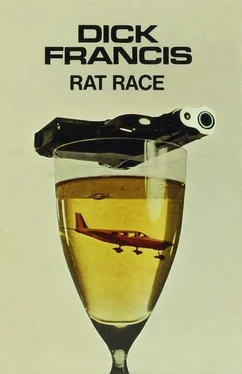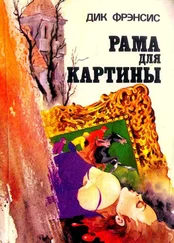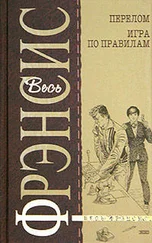I put the paper down on my knee, looked into space, and sucked my teeth.
Major Tyderman had told Annie Villars that he and a partner of his had something going for them that would make them rich. She had thought he meant control of Rudiments, but of course it hadn’t been that. The manoeuvring with Rudiments had come about simply because Tyderman couldn’t resist a small swindle on the side, even when he was engaged in a bigger one.
Tyderman had got Annie to introduce him to the Duke so that he in his turn could produce Carthy-Todd. Goldenberg was incidental, needed only for placing bets. Carthy-Todd was central, the moving mind, the instigator. Everyone else, Tyderman, the Duke, Colin, Annie, myself, all of us were pieces on his chess-board, to be shoved around until the game was won.
Clean up and clear out, that was how he must have decided to play. He hadn’t waited for the Fund to grow slowly and naturally, he’d blown up an aeroplane and used Colin Ross for publicity. He would only have stayed anyway until the claims began mounting, and if the crash victims at Newmarket were in fact insured he would be off within the week. He would stay just long enough to collect the crash-inspired rush of new premiums, and that would be that. A quick transfer to a Swiss bank. A one-way ticket to the next happy hunting ground.
I didn’t know how to stop him. There would be no proof that he meant to defraud until after he’d done it. I could produce nothing to back up my belief. No one was going to lurch into drastic action on what was little more than a guess. I could perhaps telephone to the Board of Trade... but the Board of Trade and I were hardly on speaking terms. The tall man might listen. He had, after all, once asked for my thoughts. Maybe the aircraft section had a hotline to the insurance section. And maybe not.
With a sigh I folded up Mr Whiteknight’s newspaper and glanced again at the crash on the front page. Down in one corner in the left hand column, beside the account of the accident, a paragraph heading caught my eye.
Tyderman, it said. I read the dry meagre lines underneath with a vague and then mounting feeling of alarm.
‘A man believed to be Major Rupert Tyderman was found dead early yesterday beside the main London to South Wales railway line, between Swindon and Bristol. His death, at first attributed to a fall from a train, was later established as having been the result of a stab wound. The police, who had wanted to interview Major Tyderman, are making enquiries.’
The Whiteknight parents were walking back across the apron by the time I’d decided what to do. They were displeased when I met them and said I was going to make a telephone call. There wasn’t time, they said.
‘Check on the weather,’ I lied. They looked up at the hazy heat-wave sky and gave me deservedly bitter looks. All the same, I went on my way.
The Duke’s polite manservant answered.
‘No, Mr Shore, I’m very sorry, His Grace left for Warwick half an hour ago.’
‘Was young Matthew with him?’
‘Yes, sir.’
‘Do you know if he was planning to go to the Accident Fund office before he went to the racecourse?’
‘I believe so, sir. Yes.’
I put the receiver down, feeling increasingly fearful. Rupert Tyderman’s death put the game into a different league. Lives had been at risk before, in the aeroplanes; the basic callousness was there; but on those occasions the intention had been expressly not to kill. But now, if Carthy-Todd had decided to clear up behind him... if Tyderman’s blunder with Nancy’s aeroplane, which had led to his uncovering, had also led directly to his death... if Carthy-Todd had stopped Tyderman giving evidence against him... then would he, could he possibly, also kill the simple, honest, truth-spilling Duke...?
He wouldn’t, I thought coldly. He couldn’t.
I didn’t convince myself one little bit.
The Whiteknights had no cause for complaint about the speed at which I took them to Coventry, though they consented only with bad grace when I asked to share their taxi to the races. I parted from them at the main gate and walked back towards the town centre, looking for the office of the Accident Fund. As the Duke had said, it wasn’t far: less than a quarter of a mile.
It was located on the first floor of a small moderately well kept town house which fronted straight on to the pavement. The ground floor seemed to be uninhabited, but the main door stood open and a placard on the wall just inside announced ‘Racegoers’ Accident Fund. Please walk up.’
I walked up. On the first landing there was a wash room, a secretary’s office, and, at the front of the house, a door with a Yale lock and a knocker in the shape of a horse’s head. I flipped the knocker a couple of times and the door came abruptly open.
‘Hello,’ said young Matthew, swinging it wide. ‘Uncle was just saying you would miss us. We’re just going along to the races.’
‘Come along in, my dear chap,’ said the Duke’s voice from inside the room.
I stepped into the office. At first sight a plushy one: wall to wall plum coloured carpet, but of penny-pinching quality, two fat looking easy chairs with cheap foam seats, a pair of shoulder high metal filing cabinets and a modern afrormosia desk. The atmosphere of a solid, sober, long established business came exclusively from the good proportions of the bay windowed room, the mouldings round the nineteenth century ceiling, the carved wood and marble slab of the handsome fireplace, and some dark old gilt framed oils on the walls. The office had been chosen with genius to convince, to reassure, to charm. And as clients of insurance companies seldom if ever visited its office, this one must have been designed to convince, to reassure, to charm only the Duke himself.
The Duke introduced me to the man who had been sitting and who now stood behind the desk.
‘Charles Carthy-Todd... Matthew Shore.’
I shook his hand. He’d seen me before, as I’d seen him. Neither of us gave the slightest sign of it. I hoped he had not distinguished in me the minute subsidence of tension which I saw in him. The tension I felt hadn’t subsided in the slightest.
He was all the Duke had said: a man with good presence, good voice, a thorough-going public school gent. He would have had to have been, to net the Duke; and there were all those silver framed photographs, which the Duke had mentioned, standing around to prove it.
He had dark hair with the merest sprinkling of grey, a compact little moustache, pinkish tan slightly oily-looking skin, and heavy black-framed glasses assisting his greyish blue eyes.
The Duke was sitting comfortably in an armchair in the bay window, his splendid head haloed by the shining day behind. His knees were crossed, his hands relaxed, and he was smoking a cigar. From his general air of pleased well-being, it was easy to see the pride he held in his beautiful benevolent fund. I wished sincerely for his sake that he wasn’t going to have to wake up.
Charles Carthy-Todd sat down and continued with what he had been going to do when I arrived, offering young Matthew a piece of chocolate-covered orange peel from a half empty round red and gold tin. Matthew took it, thanked him, ate it, and watched him with anxious reserve. Like the Duke, I trusted young Matthew’s instinct. All too clearly, it had switched to amber, if not to red. I hoped for all our sakes that he would have the good manners to keep quiet.
‘Give Matthew a proposal form, Charles,’ the Duke said contentedly. ‘That’s what he’s come for, you know, to join the Fund.’
Carthy-Todd obediently rose, crossed to the filing cabinet, pulled open the top drawer, and lifted out two separate sheets of paper. One, it appeared, was the proposal form: the other, a lavishly curlicued certificate of insurance. I filled in the spaces on the ultra-simple proposal while Carthy-Todd inscribed my name and a number on the certificate; then I handed over a fiver, which left me with enough to live on cornflakes until pay day, and the transaction was complete.
Читать дальше




